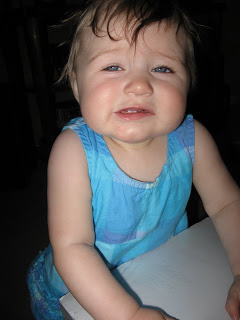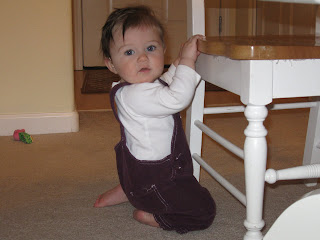
Sunday, May 31, 2009
Friday, May 15, 2009
Hearing aid info and update
Charlotte has been using her loaner hearing aids for a week now and it is going remarkably well! She rarely pulls them out and I am now a pro at putting them in. I have however, had LOTS of questions about her hearing loss and the use of the use of the aids so I thought I would share a little info here and try to answer the most often asked questions:
She seems to hear everything...how do you know she has a hearing problem?
Charlotte did not pass the newborn hearing screening done in the hospital along with 2 more done at 5 weeks and 4 months. She was then referred to have an ABR : auditory brainstem response test. The test was done while she was asleep with sensors attached to her head and earphones in her ears. Sounds of all volumes and frequencies were made and her brain response was measured.
Charlotte misses sounds in the 26 to 40 decibel range which are sounds like a clock ticking, leaves rustling, and many language sounds such as "h, g, oh, sh, p, f, th, and s". She may have trouble hearing faint or distant speech and understanding speech in a noisy environment. This is considered a MILD hearing loss.
Why are hearing aids at this age so important?
At 8 months old, Charlotte is learning speech and language by listening to others speak. She will reproduce the sounds she hears the way she hears them. A mild hearing loss can be compared to the ability to hear when the index fingers are placed in the ears. A child can "hear" but may miss fragments of speech leading to misunderstanding and difficulty in the classroom. With a 30 dB loss, a child can miss 25-40% of the speech signal and at 40 dB they may miss 50% of class discussions, especially when a voice is faint or the speaker is not in thier line of vision. They will also miss unemphasized words and consonants, especially when the high frequency loss is present. (Charlotte's case) Many experience difficulty learning early reading skills such as letter/sound associations. This can have a great impact of self esteem as a child is likely to be accused of "hearing when she wants to", "daydreaming", or "not paying attention" and may believe she is less capable due to difficulties understanding in class. Also, if untreated, a child begins to loose the ability for selective listening and has increasing difficulty supressing background noise causing the learning environment to be more stressful and the child will be more fatigued due to the effort needed to listen. Finally, we need to realize that we "hear" with our brains and at this age, Charlotte's brain is laying down new and important nueral pathways that will function for the rest of her life. This is the only time when the brain will do this so delaying hearing aid use will actually reduce her brain development.
Is there an operation to "fix" the problem?
No. In Charlotte's case, she is either missing or has damaged "Cilia"....the little hairs in the inner ear that respond to vibration and tell the brain that sound is coming into the ear. There is no solution today other than augmentation with a hearing aid.
How are you handling all of this?
I am doing great! I am just so thankful for the technology available that diagnosed the issue and provided a solution... and for the WONDERFUL audiologists and supporting staff with the Columbia Regional Program who I have been working with. I am also grateful that her hearing loss is not profound and that she is healthy in every other way AND that I have the opportunity through this to learn to have meaningful and educational play time with her as well as to teach her sign language. I may not have had the motivation to do these things if the circumstances were different. Lastly, I am so thankful for the support and encouragment of family and friends. God is good and Pete and I are truly blessed!
She seems to hear everything...how do you know she has a hearing problem?
Charlotte did not pass the newborn hearing screening done in the hospital along with 2 more done at 5 weeks and 4 months. She was then referred to have an ABR : auditory brainstem response test. The test was done while she was asleep with sensors attached to her head and earphones in her ears. Sounds of all volumes and frequencies were made and her brain response was measured.
Charlotte misses sounds in the 26 to 40 decibel range which are sounds like a clock ticking, leaves rustling, and many language sounds such as "h, g, oh, sh, p, f, th, and s". She may have trouble hearing faint or distant speech and understanding speech in a noisy environment. This is considered a MILD hearing loss.
Why are hearing aids at this age so important?
At 8 months old, Charlotte is learning speech and language by listening to others speak. She will reproduce the sounds she hears the way she hears them. A mild hearing loss can be compared to the ability to hear when the index fingers are placed in the ears. A child can "hear" but may miss fragments of speech leading to misunderstanding and difficulty in the classroom. With a 30 dB loss, a child can miss 25-40% of the speech signal and at 40 dB they may miss 50% of class discussions, especially when a voice is faint or the speaker is not in thier line of vision. They will also miss unemphasized words and consonants, especially when the high frequency loss is present. (Charlotte's case) Many experience difficulty learning early reading skills such as letter/sound associations. This can have a great impact of self esteem as a child is likely to be accused of "hearing when she wants to", "daydreaming", or "not paying attention" and may believe she is less capable due to difficulties understanding in class. Also, if untreated, a child begins to loose the ability for selective listening and has increasing difficulty supressing background noise causing the learning environment to be more stressful and the child will be more fatigued due to the effort needed to listen. Finally, we need to realize that we "hear" with our brains and at this age, Charlotte's brain is laying down new and important nueral pathways that will function for the rest of her life. This is the only time when the brain will do this so delaying hearing aid use will actually reduce her brain development.
Is there an operation to "fix" the problem?
No. In Charlotte's case, she is either missing or has damaged "Cilia"....the little hairs in the inner ear that respond to vibration and tell the brain that sound is coming into the ear. There is no solution today other than augmentation with a hearing aid.
How are you handling all of this?
I am doing great! I am just so thankful for the technology available that diagnosed the issue and provided a solution... and for the WONDERFUL audiologists and supporting staff with the Columbia Regional Program who I have been working with. I am also grateful that her hearing loss is not profound and that she is healthy in every other way AND that I have the opportunity through this to learn to have meaningful and educational play time with her as well as to teach her sign language. I may not have had the motivation to do these things if the circumstances were different. Lastly, I am so thankful for the support and encouragment of family and friends. God is good and Pete and I are truly blessed!
Wednesday, May 13, 2009
Thursday, May 7, 2009
Charlotte's Hearing Aids





Charlotte has a mild hearing loss and needs hearing aids to make sure her speech and language develop properly. This first pair is a loaner pair that will be used while more testing is done to determine exactly what kind of hearing aid we should buy. This is a great program since these hearing aids cost $500 to $1000 a piece! The expensive "computer" part of the aid goes behind the ear....so we don't have to replace it every couple of months as she grows.....and the silicon ear mold gets re-made as needed. She will get her own pair in the Fall...I think we will get pink ones ;) They also gave us the little bonnet to put on her if she tries to pull the aids out of her ears. I think she wanted one in a different color....she does not look happy:( It was pretty cool to see her reaction when I talked to her the first time with the aids in....she really did respond to me much quicker and was listening more intently! Praise God for the technology and the wonderful people with the Early Intervention Program:)
Tuesday, May 5, 2009
Subscribe to:
Comments (Atom)









































